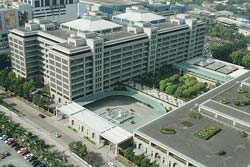|
 The Asian Development Bank (ADB) will hold its annual meeting this weekend in Manila, Philippines, to discuss a global food crisis that has led to stinging criticism of its international governors for failing to see it coming. The Asian Development Bank (ADB) will hold its annual meeting this weekend in Manila, Philippines, to discuss a global food crisis that has led to stinging criticism of its international governors for failing to see it coming.
This crisis, and the inflation it is stoking, is expected to feature prominently in the meeting where the region's finance ministers seek ways to shield their economies from higher costs. Japan's Fukushiro Nukaga, China's Xie Xuren, South Korea's Kang Man Soo and Southeast Asian ministers are meeting at the sidelines of the ADB meet. Ministers from South Korea, Japan and China will also discuss setting up a forum on the economy and financial regulatory issues when they meet in Madrid, South Korea's finance ministry said in a statement. The three finance ministers ''will discuss setting up an Asian Financial Stability Forum to strengthen regional cooperation among the policy and financial supervisory authorities to counter instability of international financial markets,'' the ministry said. Crude oil has risen 85 per cent, and rice prices have more than doubled since Asian finance ministers met a year ago in Kyoto, Japan. This has led to a supply crunch that is worrying governments wary of popular unrest. Their feelings are not unfounded because unrest over the food crisis has led to deaths in Cameroon and Haiti, cost Haitian Prime Minister Jacques Edouard Alexis his job, and caused hungry textile workers to clash with police in Bangladesh. Vietnam and other rice-producing nations have curtailed exports to maintain supplies and damp local inflation, pushing up prices for buyers in rice importing countries such as the Philippines, the world's biggest importer of the grain. Corn, wheat and soybean prices have all reached records this year too.  Even the United Nations (UN) has been forced to constitute a task force to address this issue, and other international bodies like the World Bank and the World Trade Organization (WTO) have also added their voices to the matter. (See: UN chief Ban Ki-moon to head task force to tackle global food crisis) Even the United Nations (UN) has been forced to constitute a task force to address this issue, and other international bodies like the World Bank and the World Trade Organization (WTO) have also added their voices to the matter. (See: UN chief Ban Ki-moon to head task force to tackle global food crisis)
Richer nations like the US and Britain have also expressed their concerns and promised aid to help tide over the crisis. Earlier this month, at a global conference of experts called by British prime minister Gordon Brown, Josette Sheeran of the UN's World Food Programme (WFP) had described the current food crisis, a ''silent tsunami'' that threatened to plunge more than 100 million people on every continent into hunger. (See: Tsunami of hunger threatening 100 million people worldwide: World Food Programme) ADB president Haruhiko Kuroda warned recently that soaring food prices had pushed back Asia's fight against poverty, and that some countries may one day need foreign aid to feed their hungry. There are other tough issues facing the bank, notably a simmering internal row among its members over its continuing relevance in a region that has been transformed since the lender was founded 42 years ago. The ADB was formed in 1966 to improve the welfare of people in the Asia and the Pacific. Based in Manila, it is owned by its 67 member countries - 48 from the Asia-Pacific region, and 19 from elsewhere around the world. Two-thirds of the world's poor reside in Asia, and about 600 million Asians survive on less than $1 a day. The lender expects to disburse about $10 billion in loans in 2008, after lending $10.1 billion last year.
|